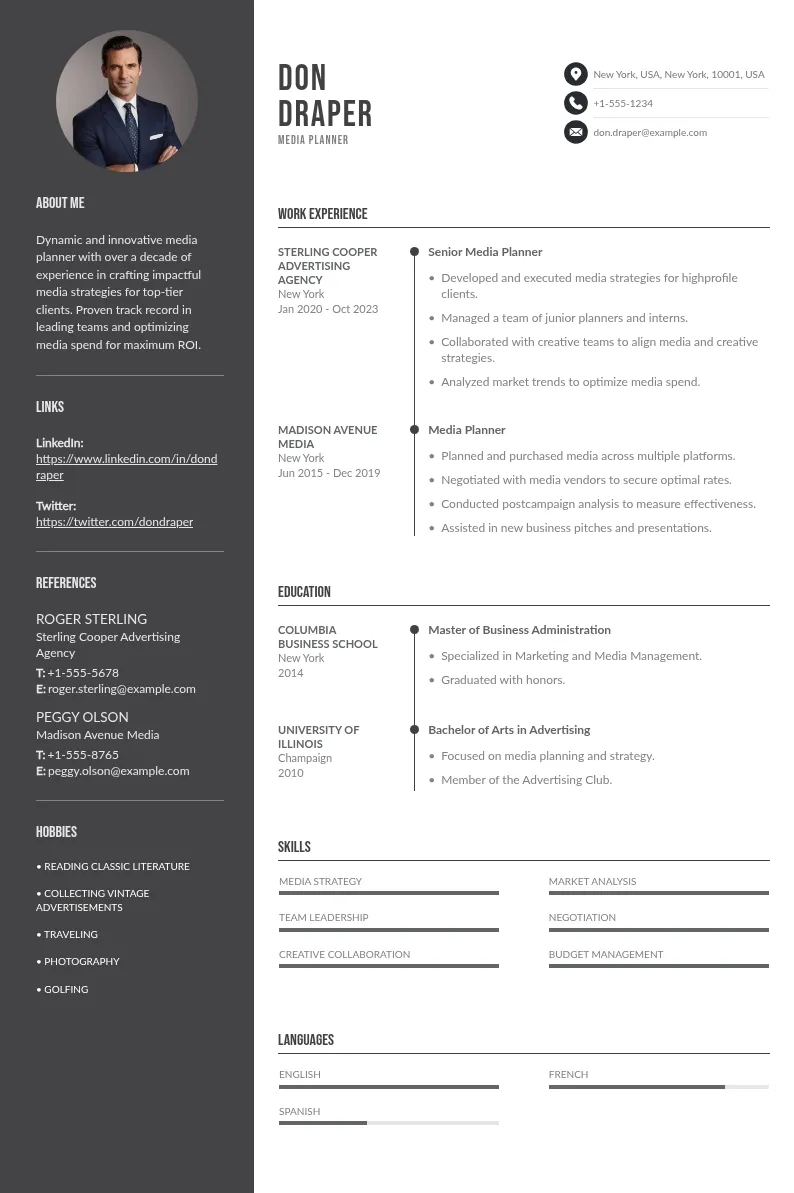



You’ve spent time mastering media strategy, campaign planning, and budget allocation. Now it’s time to put those skills on paper. A strong media planner resume can help you land interviews at top agencies, stand out to marketing departments, or position yourself for freelance opportunities.
In this guide, we’ll show you how to create a media planner resume that gets noticed. We’ll cover the right format, what to include, and how to write it. You’ll also see real examples to help you get started.
Writing a media planner resume does not need to feel overwhelming. The key is to keep it clear, measurable, and relevant to the work you do. Here are practical steps to create a resume that employers will pay attention to.

The top section of your resume is your first impression. Use it to explain who you are and what makes you a strong media planner in two to four sentences. Mention your years of experience, the types of campaigns you’ve managed, and your areas of expertise, such as digital media buying, cross-platform planning, or ROI analysis.
This section should capture both your analytical skills and your ability to drive results.
This section is the backbone of your resume. List your media planning roles, starting with the most recent one. For each position, include:
Focus on measurable results. Instead of writing “Planned media campaigns,” use something like:
If you have worked across multiple platforms, specify them (social media, programmatic, broadcast, out-of-home, etc.). Employers want to see range as well as depth.
Media planners often come from backgrounds in marketing, advertising, or communications. List your degree(s), certifications, or relevant coursework. If you have completed Google Ads certifications, Facebook Blueprint, or programmatic training, add those as well.
Media planning is data-driven, so technical proficiency is essential. Create a dedicated Skills section that lists the tools and platforms you know. Keep it focused on media and analytics, not generic workplace skills.
Your resume should be easy to scan. Use a clean, modern font like Arial or Calibri at size 10–12. Bold your section headings and use bullet points for responsibilities and achievements. Keep spacing consistent and margins balanced.
One page is enough if you’re early in your career. Two pages work if you have over a decade of experience with multiple campaigns.
Avoid cluttered or overly designed templates. A recruiter will focus on numbers and experience, not flashy graphics.
Want to stand out from other applicants? Add sections that highlight your achievements beyond day-to-day planning.
Ideas include:
Not every media planner position is the same. A role at a global agency may prioritize large budgets and international campaigns, while an in-house position may focus on niche markets and direct-to-consumer targeting.
Read the job description carefully and adjust your resume to match. If the listing emphasizes programmatic buying, highlight your work with DSPs. If it calls out cross-channel campaign management, make sure you include examples of that experience.
Recruiters don’t just want to see what you’ve done, they want actual proof you’re future-ready. Adding emerging trends shows you’re keeping pace with industry shifts. Highlight tools like AI-driven campaign analysis, cookieless tracking strategies, privacy compliance (GDPR/CCPA), and programmatic platforms such as DV360 or The Trade Desk. Frame them in measurable achievements, not just skills.
This positions you as a forward-thinking media planner who can adapt to new tools, regulations, and evolving advertising landscapes.
Even a strong background can get lost if your resume is cluttered with mistakes. Here are some common pitfalls to watch for and how to avoid them.
General statements like “Planned media campaigns” or “Worked with client's media budgets” do not tell employers much. Always back up your experience with numbers, platforms, or outcomes. Show the scale of your work and the results you delivered.
Phrases such as “team player” or “self-starter” are not real buzzwords and do not carry much weight. Focus on skills directly tied to the media planning process, like programmatic buying, cross-channel optimization, or vendor negotiation.
Media planning is data-driven. If you leave out campaign metrics such as ROI, CTR, or CPM, your resume will sound less convincing. Numbers make your achievements tangible.
A resume that is dense, messy, or overly designed can be hard to read. Stick to a clean layout with clear headings, bullet points, and consistent spacing.
Employers can tell when you send a generic application. Tailor your summary, skills, and experience to match the specific job description.
Avoiding these mistakes ensures your resume highlights your expertise and makes a professional impact.
Most companies use applicant tracking systems (ATS) to scan resumes before a human ever sees them. If your resume isn’t keyword-optimized, it may get filtered out.
Media planner keywords to include:
Weak vs strong keyword use:
Avoid ATS-killing mistakes:
Need inspiration? These examples show what a clear, well-structured media planner resume can look like. Use these CV samples as a reference when creating your own.

Before you start writing, it is important to choose a resume format that highlights your strengths. The way you structure your information can make a big difference in how recruiters view your experience. For media planners, three main formats work best: chronological, functional, and combination.
The chronological format is the most common. It lists your work history starting with the most recent role and moving backward. This option works well if you have steady experience in media planning or related advertising roles. Employers like it because they can quickly see your career progression and the scope of your responsibilities.
The functional format focuses more on skills than job history. Instead of emphasizing when or where you worked, it highlights categories like digital media strategy, vendor negotiation, or programmatic buying. This structure can be useful for career changers or professionals who have gaps in their work history. However, some recruiters prefer to see a timeline, so use it carefully.
The combination format blends both approaches. It begins with a skills summary and then lists work experience in chronological order. This is often the best fit for media planners because it allows you to highlight technical expertise (such as working with Google Ads or Nielsen data) while also showing how you applied those skills in real roles.
No matter which format you choose, keep it clear and consistent. Recruiters should be able to find your key skills, achievements, and experience within a few seconds of scanning your resume.
Your media planner resume should reflect both your professional expertise and your ability to deliver measurable results. Keep it clear, results-driven, and tailored to the role you’re applying for. Focus on achievements, tools, and skills that show you can manage campaigns effectively and maximize ROI.
Remember, a resume is not just a list of tasks. It is a proof of your ability to plan, execute, and optimize campaigns that matter. Present your experience in a straightforward way, and you’ll be far more likely to catch the attention of employers and clients.
Our collection of expertly designed cover letter templates will help you stand out from the crowd and get one step closer to your dream job.

